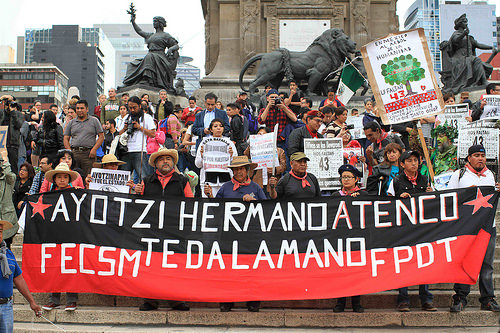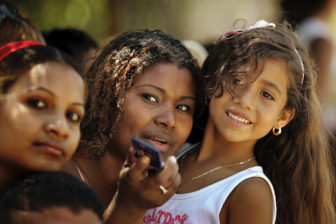On March 26, several hundred protesters gathered around the Angel of Independence in Mexico City to mark the six-month anniversary of the disappearance and apparent massacre of 43 students in the town of Iguala in Guerrero state. Diego Martínez, a skinny 24-year-old medical student standing at the top of the stairs of the monument explained, “I came today because it’s been six months [since the students’ disappearance] and we want to remind the government that the movement hasn’t died out.”
View a slideshow from the March 26 protests below.
Protesters had a broad agenda, decrying violence and corruption as well as a perceived crackdown on independent journalism. Several signs in the crowd referenced investigative reporter Carmen Aristegui, who was dismissed from her wildly popular radio show shortly after demanding the reinstatement of two of her reporters, who were fired after launching a site meant to expose government wrongdoing. The reporters, Daniel Lizárraga and Irving Huerta, had exposed a major conflict of interest scandal involving President Enrique Peña Nieto’s family.
On the main thoroughfare of Reforma Avenue, two men carried a giant banner that read: “Carmen Aristegui, the only journalist who tells the truth: the people are with you.” A diminutive elderly woman named Elena García Salinas held up a sign that said, “Carmen Aristegui’s firing is shameful.”
While the March 26 protest was much smaller than the massive (and sometimes violent) demonstrations that took place in late 2014, the march was a reminder of Mexican citizens’ many frustrations with their government. According to some estimates, 98.5 percent of all crime goes uninvestigated in Mexico. More than 22,000 people have “disappeared” in Mexico since 2006. The country recorded 1,698 kidnappings in 2013, Peña Nieto’s first year in office, but some civil society groups think the real number could be twenty times higher or more.
For now, although some drug war battlegrounds like Ciudad Juárez and Acapulco have recently improved and Peña Nieto has proposed reforms designed to modernize Mexico’s local police forces, the president faces an uphill battle. While his government has succeeded in passing a series of internationally applauded reforms, Peña Nieto is still striving to kick-start a new era of economic growth.
The public, meanwhile, remains focused on the issue of violence. The president’s approval rating has plummeted, and ahead of the June 2015 mid-term elections, Peña Nieto’s PRI party is losing support on both the right and left as voters promise to vote for the right-of-center PAN party and the leftist MORENA party.
The disappearance of the 43 students in Iguala has resonated with millions of Mexicans because it is part of a broader problem. People in Mexico are frustrated with crime and impunity—and the firing of Aristegui has become one more rallying cry for a discontented public.
All photos courtesy of the author.








